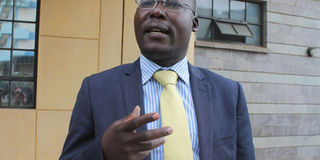Transgender woman wins case against exams body Knec over name change

Lawyer Colbert Ojiambo, who represented Audrey Mbugua in a case against Knec, addresses journalists outside the Milimani Law Courts on Tuesday after a judge ordered the exam body to issue new certificates reflecting her new names. PHOTO | PAUL WAWERU | NATION MEDIA GROUP
What you need to know:
- Justice Weldon Korir on Tuesday gave Knec 45 days to recall the certificate, number 1855399, issued in the name of Ithubu Andrew Mbugua and bearing “M” for the male gender, and replace it with “Audrey Mbugua” but without a gender mark.
- The judge said the Constitution urges “us to treat people with dignity and that such human dignity goes to the heart of identity, which often can be violated by humiliation and denial of rights,” the judge said.
A transgender woman who sought a name change on her examination certificate has won a protracted legal battle with the national examiner.
A court on Tuesday compelled the Kenya National Examinations Council (Knec) to give Ms Audrey Mbugua a fresh testimonial reflecting her altered state.
Ms Mbugua had sued Knec for refusing to change her names and delete the “male” gender mark from her certificate despite tabling a gazette notice reflecting her new identity.
Justice Weldon Korir on Tuesday gave Knec 45 days to recall the certificate, number 1855399, issued in the name of Ithubu Andrew Mbugua and bearing “M” for the male gender, and replace it with “Audrey Mbugua” but without a gender mark.
The judge said a gender mark in a certificate neither adds value to the exams administered nor the marks awarded and “removal does not dilute its quality”.
He said Audrey had clearly demonstrated that she is different.
'TRAPPED IN MAN'S BODY'
“She is a woman trapped in a man’s body ... the pull towards the feminine is clearly overwhelming and therefore I would not hesitate to make an order that will make the applicant feel complete,” the judge said.

Ms Audrey Mbugua after a previous court hearing. PHOTO | FILE
The judge said the Constitution urges “us to treat people with dignity and that such human dignity goes to the heart of identity which often can be violated by humiliation and denial of rights.”
He said that for Audrey to feel “whole” she must be accepted as she is and denying her the right to change her names in the certificate would amount to a violation of fundamental human rights and liberty.
Audrey’s lawyer, Colbert Ojiambo, had told the court that his client was born with a Gender Identity Disorder (GID) and has been undergoing therapy at a city hospital.
The judge said he had also looked at similar transgender cases and formed an opinion that they all boiled down to issues of human dignity.
GENDER MARK
“The applicant produced a Kenya Gazette notice dated January 19, 2012, when he changed his name to Audrey and the attorney-general said he would not be opposed to change of name. The applicant also pointed to the court what the law required,” the judge said.
He said rule 9(1) of the Examinations Act states that a certificate shall show the name of the candidate, registration number, the subjects covered with reference to grades and has to be issued through a stated protocol.
Justice Korir said the law allows that a certificate once issued may be withdrawn for amendment and that the gender mark was not mandatory.
“The gender mark is therefore not a requirement but only a tradition used to assist in identifying a candidate but not backed by any law,” he said.
A month ago, Audrey was in the centre of another legal battle pitting her against the NGOS' board, which has since been compelled to register her organisation, Transgender Education and Advocacy.




